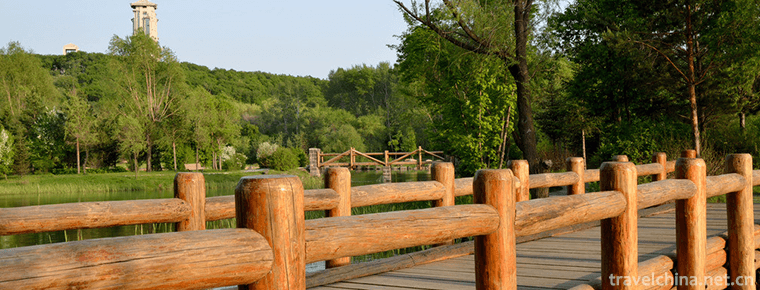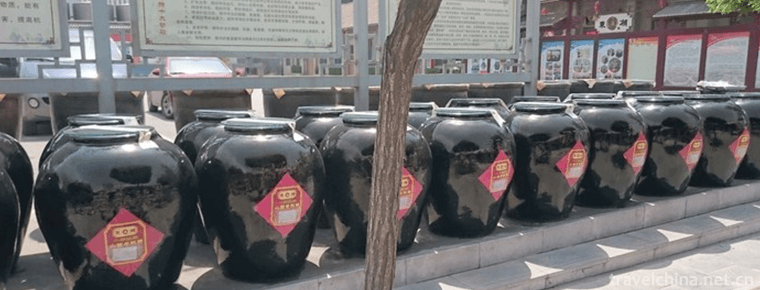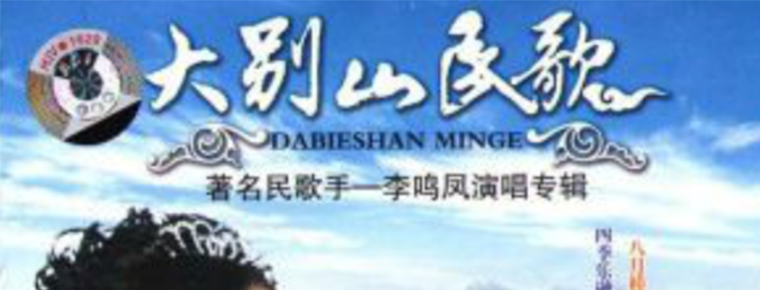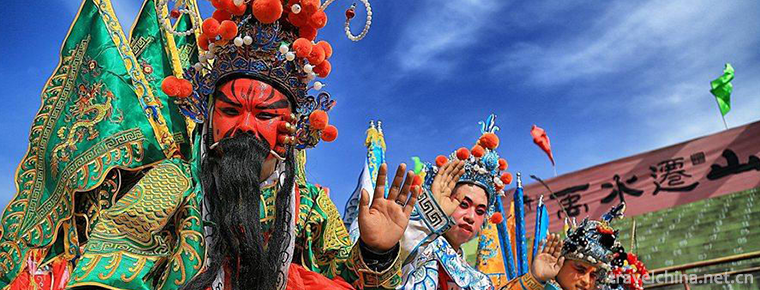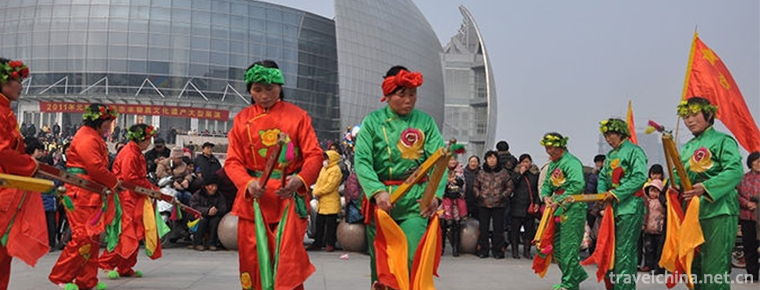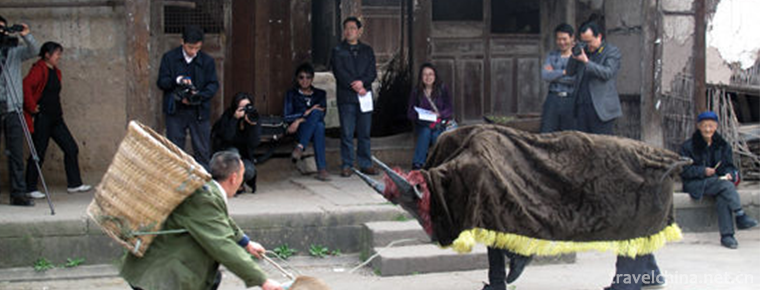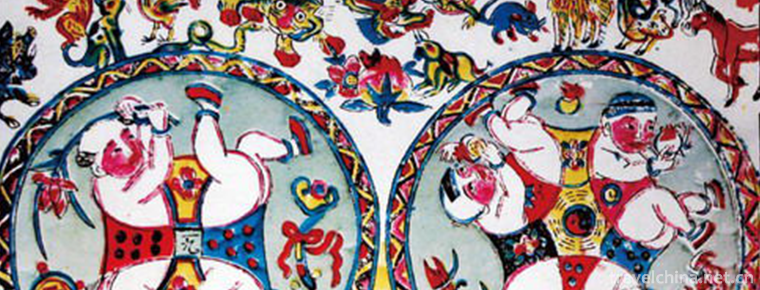Ma Street book fair
Ma Street book fair
The Majie Book Club is a grand Chinese folk music festival. Located 5 kilometers south of Baofeng County, Henan Province, it is a "pilgrimage site" for rap artists all over the country. Every year on the thirteenth day of the first lunar month, thousands of opera artists gather here with drums and pianos to worship their ancestors and apprentices at the Temple of Fire. They make curtain with the sky, take the ground as the platform, make friends with music, light books and sell books. There are more than 40 kinds of operas such as Jingyun Dagu, Shandong Qinshu, Sanxianshu and thousands of traditional and modern repertoires.
On May 20, 2006, the Majie Book Society was approved by the State Council to be included in the first batch of national intangible cultural heritage lists.
Historical origin
The Thirteenth Session of Ma Jie has a long history. According to the records of Guangyan Temple and Fire Temple Monument in Majie, this ancient temple Congress began in Yuan Dynasty and flourished in Ming and Qing Dynasty. Street books have a long history, but there are different opinions about their origins.
First, in the Spring and Autumn Period, Yingguo Doctor Zhang Shu liked to play and sing, and his skills were excellent. In his later years, he settled on the street, and many people came to visit him. Zhang Gong died on the thirteenth day of the first month of the year. Friends commemorated him. It was convenient for him to gather on the street every year to make friends with Quhuai. This continued.
One is that before the Eastern Han Dynasty, Wang Mang banished Liu Xiu to the Ying River bank east of Majie Village. It was the thirteenth day of the first lunar month. The villagers and artists who were sacrificing at the Fire Temple helped the Han Army to compete and prevent the Mang Army from pursuing troops. When Liu Xiu became emperor, he decreed that the three-year Royal grain in the area of Ma Jie should be removed and the imperial plate of the "Three Emperors'Club" should be given. Later, people here took the day of rescue as the meeting period and began meeting every year to thank the emperor for his kindness. Up to now, there is still the saying of "Guangwufeng and Shuhui Xing".
One is that at the end of the Song Dynasty, there was a Zhu Xiucai in Ma Jie who was recording in Nanyang Mansion. He often wrote some songs for people to sing and made many friends. Later, he returned to his hometown, died of illness in January of one year. On the thirteenth day, artists from all walks of life rushed to the street, set up bookstalls, and played the songs he wrote in memory. Over time, today's book fair was formed.
Another is that there was an old artist named Madeping in Ma Street in his early years. Peaches and plums filled the world. On the thirteenth day of the first lunar month every year, disciples came from all directions to celebrate his birthday. Year after year, this has gradually become a tradition.
Although there are different opinions on the causes of book clubs, artists have passed on from generation to generation. There are more and more storytelling in Lama Street, and there has been no interruption since Yuan Dynasty.
The inscriptions of Guangyan Temple and Fire Temple in Majie are as follows: during Yanyou period of Yuan Dynasty, the book fair of Majie took shape, and about 1000 artists came to write every year, especially during Tongzhi period of Qing Dynasty. He had been a Confucian Oracle in Nanyang Prefecture and was elected as the head of the book club when he returned to his hometown. In the second year of Tongzhi (1863), he counted the number of storytellers who attended the meeting once. He asked the artists who had attended the meeting this year to put incense money in the temple of fire. Before the incense case, they put a big fight. Each artist was allowed to enter only one article, and then counted down two or seven strings. That is to say, there were 2700 artists attending that year.
Inheritance value
The Majie Book Club, which has been listed as one of the "rescue projects of endangered folk culture in Henan Province", is a cultural event spontaneously formed by Chinese farmers born and bred in rural areas of China, and is called a great wonder in the history of Chinese culture.
As a place of exchange and cultural space with distinctive characteristics, the prominent features of the Majie Book Club are: 1. large-scale, ranking the top in the country; 2. long history, long history; 3. storytelling "writing book" (contracting storytelling with artists), unique form; 4. rich connotation and great influence; 5. meeting friends with books, deep feelings of art hometown.
The Street book club provides a good place for artists to discuss their skills. Every year during the book festival, performers from all over the world come to "Liangshu" (show the art of storytelling) with piety. They say, pull, play and sing on the stage of the sky and the ground. They are handed down from generation to generation by their artistic friends. More than 100,000 spectators are moving around, affecting hundreds of kilometers around the radiation.
The State attaches great importance to the protection of intangible cultural heritage. On May 20, 2006, the folklore was approved by the State Council and listed in the first batch of national intangible cultural heritage lists.
Rescue measures and future
After the Majie Book Club was listed as the national intangible cultural heritage list, the Henan government launched the "Henan Endangered Folk Culture Rescue Project" to protect the Majie Book Club salvagely, such as enlarging the meeting time, introducing the bidding mechanism, and guaranteeing the interests of artists to the greatest extent. As a result, the once-shrinking book club had a grand appearance again. In 2009, there were more than 1,000 artists and more than 180 bookshelters. More than 200,000 people attended books, basically reappearing the peak of history.
It is believed that the street books will continue to grow and grow under the protection of effective measures, and then take a new step.
A Wonderful Flower Nurtured by Yinghe River
Majie Book Club, a wonderful flower nurtured by Yoyo Yinghe River. According to the inscription of Guangyan Chan Temple in Majie, there is a fairyland in Shiqu (the old river name from Shicun to Maduzhai section). It is impossible to imagine that there is a fairyland in Shiqu (the old river name from Shicun to Maduzhai section). Wang Dun, a native of Ruzhou in the Qing Dynasty, wrote in his poem Yingshui Yashi: "Shizhouyong is on the sea, the Three Gorges controls the river and Pu, and the people who have to move mountains are thrown into pieces to answer the water margin..." Rushing water is like snake, rugged stone is like tiger, chaotic spring touches stone, fragrant and refreshing lung and fu. Weird stones swallow cold springs, flat Rufu half spit, exquisite by nature, Qiqianqian ghost axe..." In the Qing Dynasty, the priest of Nanyang Prefecture selected a poem to say: Five old people traveled with each other to meet the water, and the elegant collection of Cheji was magnificent. Fish leap and green waves follow the waves, drinking willow flying flowers beside the dike. Stone inscription poems moss knot words, beach quiet gull sleeping shadow in the sand. Every year the book will come together, drunk to the sunset. Unfortunately, in the 1980s, when quarries and artillery fired, both elegant stone and poetry were destroyed.
According to the inscriptions of the Fire Temple and Guangyan Temple in Majie Village, the Book Club originated in the period of Yanyou in Yuan Dynasty (around 1316 AD) and has lasted for more than 680 years. According to legend, 670 years ago, there was an old artist named Madeping in Majie Village. Peaches and plums were everywhere. On the thirteenth day of the first lunar month, disciples came from all directions to celebrate Ma Lao's birthday. In western Henan, there is also the custom of writing operas and listening to books at leisure by the farmers in January, which forms the Male Street Book Club in its prime of one year. The wind shakes the trees and the rain rustles the grass. Sanxianshu, tunes in major, drum books, book reviews, piano books, Taoist sentiments, fishing drums, flower drums, voiceless, Henan falling song... The traditional folk rap spread in the north and south of the Yangtze River is just like the sound of wind, rain and water in the world. It is the natural sound of the river of human history and the clang string sound of life flowing through the folk.
Ma Jie, a seemingly ordinary village on the Bank of Yinghe River, attracts overseas scholars from the United States and Japan to visit it as a sacred place of folk culture. Because of the influence of the Book Club, in 1995, the Second Chinese Quyi Festival was held in Pingdingshan. The special videotapes of the 13th Ma Street Book Club filmed by the Overseas Chinese Office of the State Council and the production team of CCTV China News were sent to embassies abroad. Majieshu is praised as one of the "Top Ten Folk Customs of China", and Baofeng County has been named "the Town of Quyi" and "the Town of Chinese Folk Art" by the relevant state departments. On May 20, 2006, Ma Jieshu will be officially listed in the "first batch of national intangible cultural heritage list" by the State Council.
According to legend, when King Xia Yu was king, there was a tribal leader named Yu Bo who assisted King Yu in water management. Yu Boren was a disciplinarian, leading people to dig mountains and open rivers, hydrophobic into the sea, footprints throughout China, outstanding merits, the people support. Therefore, King Yu gave Yu Bozi the surname of "Fengshang, Renhuo Zheng". In order to benefit the Li people, Yubo built a "fire platform" and spread it to the people for their use. People then regarded it as the "god of fire".
At that time, in the Huanghuai River Basin, floods crossed, and Yiluo moved southward to a vast ocean in Luyang (today's Lushan). Yubo led the crowd, and dredged floods into the sea and returned good farmland to the people in Longmen, North Kailongmen and South Chisel Yingyuan (Liangwa Town, Shandong Province). However, Yinghe River is fierce, and people's lives and property on both sides of the Taiwan Strait are threatened by floods. According to local folklore, there are Jiaogui in Yinghe River. In order to prevent demons and evil spirits from suffering, people built "Yu Bo Temple" (later called Fire Temple) on the Bank of Yinghe River. From then on, the people lived and worked in peace and contentment in the countryside. There were legends of Huanglong fighting evil Jiao among the people.
Anecdotes of book Societies
Over the years, Majieshu Club has been organized, but this kind of organization is relatively loose. Tongzhi two years in the Qing Dynasty, when the chief minister was elected, someone asked how many artists he came to attend the meeting? Of course, the priest can't say it out, but he is a very effective person. He lets one of his supervisors put a big fight on the incense case of the temple of fire. He asks the artist who says books to put incense money into the temple of fire. A person can only throw a copper coin, no more or less. After the meeting, he counts it. There are two hundred or seven hundred copper coins, meaning that is, almost 2700 artists come to the meeting.

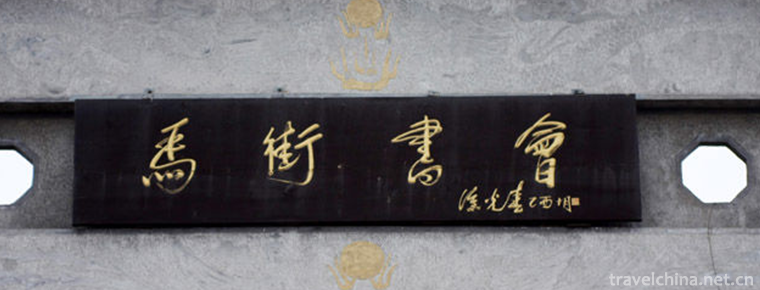
-
Jingyuetan National Scenic Area
Jingyuetan, National AAAAA Class Tourist Scenic Spot, National Scenic Spot, National Forest Park, National Civilized Scenic Spot Demonstration Site, National Water Conservancy Scenic Spot.
Views: 237 Time 2018-12-05 -
Vinegar garden in East Lake
Donghu Vinegar Garden is located at No. 26 Madaobo between Dongshan Expressway and Jianbei Road in Taiyuan City. It covers an area of more than 20,000 square meters. Shanxi is most famous.
Views: 131 Time 2018-12-20 -
Dabie Mountain Folk Songs
Dabie Mountain folk song is a traditional folk song widely circulated in the west of Anhui Province. With the unique regionality of the interdependence of mountains and rivers.
Views: 246 Time 2019-04-23 -
Folk fire Min Jian She Huo
Folk society fire is a kind of folk entertainment popular in China during the Spring Festival. It is widely spread in Shaanxi, Shanxi, Hebei, Henan, Liaoning and other provinces. On May 20, 2006, Folk.
Views: 154 Time 2019-06-05 -
Shangyang Dance
Shangyang Dance originated in the northern part of Juancheng County and spread around Li Jinshitang Town and Old Town. It is represented by Xinggrang Village of Li Jinshitang Town. According to textua.
Views: 404 Time 2019-06-13 -
Play with cattle
Playing cattle originated from the worship of nature in ancient times. In the era of farming civilization, cattle farming is particularly important for people's production and life. Therefore, through.
Views: 334 Time 2019-06-25 -
Wuqiang Wood Engraving New Year Picture
Wuqiang New Year's Painting is one of the traditional folk crafts in Wuqiang County, Hebei Province. It is named for its origin in Wuqiang County, Hebei Province. It is a unique style of Chinese folk .
Views: 100 Time 2019-06-30 -
Anhui Medical University
Medical University Of Anhui (Anhui Medical University), referred to as "an Medical University", located in the capital of Anhui. Hefei City Yes. Key universities in Anhui By Anhui Provincial.
Views: 102 Time 2019-10-10 -
Zigong Salt History Museum
Zigong Salt History Museum is located in the center of Zigong, Sichuan Province. It was built in 1959. It is one of the earliest professional museums in the history of Chinese museum development. It is still the only Museum of salt history in China. On May 18, 2017, it was promoted to the third batch of national first-class museums. .
Views: 166 Time 2020-10-15 -
Deyang secondary industry
In 2018, the total industrial added value of Deyang City was 101.28 billion yuan, an increase of 9.8% over the previous year. By the end of the year, there were 1376 Industrial Enterprises above Designated Size, and the added value of industries above.
Views: 321 Time 2020-12-14 -
Deyang scenic spot
There are Sanxingdui ancient Shu civilization sites in Deyang City, where a large number of national treasure level cultural relics such as bronze Dali Man, bronze mask, bronze sacred tree, gold stick and Bian Zhang were unearthed. There are also the pangtong.
Views: 299 Time 2020-12-14 -
Geomorphological characteristics of Mianyang
The terrain is high in the north and low in the south, and the height difference is large. The northwest of Mianyang City is located in the eastern edge of the Qinghai Tibet Plateau, with high terrain and overlapping peaks. The southwest part belongs.
Views: 108 Time 2020-12-14
